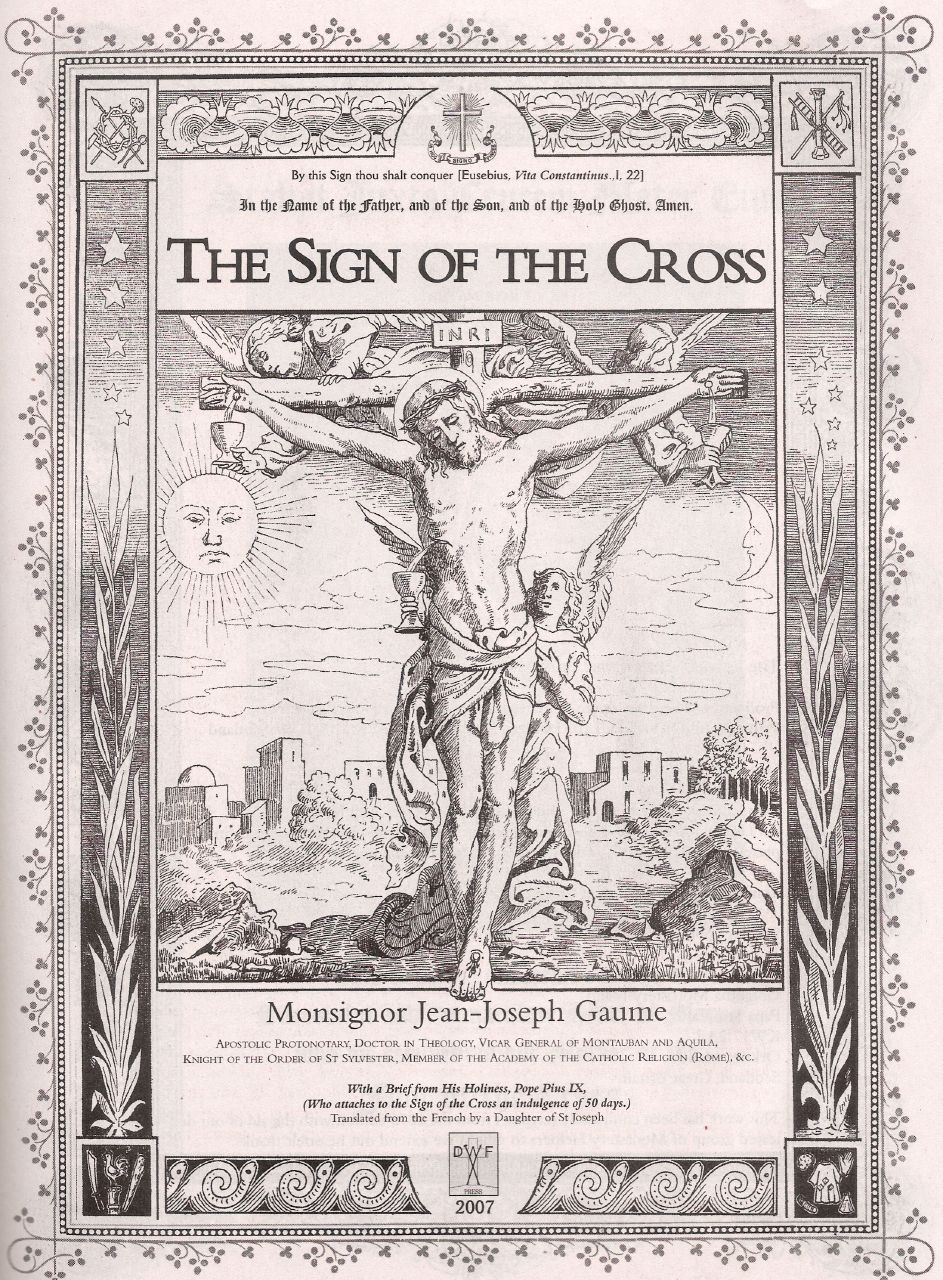Saint Louis IX
By this Sign thou shalt conquer.
In hoc signo vinces.
 on Saint Louis in the 3rd letter of Mgr. Gaume to Frederic.
on Saint Louis in the 3rd letter of Mgr. Gaume to Frederic. On Saint Louis IX from BUTLER'S LIVES of the SAINTS:
SAINT LOUIS, King of France, loyal and faithful servant of the Lord
From "Lives of The Saints with Reflections for Every Day in the Year" by Rev. Alban Butler.
The mother of Louis told him she would rather see him die than commit a mortal sin, and he never forgot her words. King of France at the age of twelve, he made the defense of God's honor the aim of his life. Before two years, he had crushed the Albigensian heretics, and forced them by stringent penalties to respect the Catholic faith. Amidst the cares of government, he daily recited the Divine Office and heard two Masses, and the most glorious churches in France are still monuments of his piety. When his courtiers remonstrated with Louis for his law that blasphemers should be branded on the lips, he replied, "I would willingly have my own lips branded to root out blasphemy from my kingdom." The fearless protector of the weak and the oppressed, he was chosen to arbitrate in all the great feuds of his age, between the Pope and the Emperor, between Henry III and the English barons. In 1248, to rescue the land which Christ had trod, he gathered round him the chivalry of France, and embarked for the East. There, before the infidel, in victory or defeat, on the bed of sickness or a captive in chains, Louis showed himself ever the same, -- the first, the best, and the bravest of Christian knights. When a captive at Damietta, an Emir rushed into his tent brandishing a dagger red with the blood of the Sultan, and threatened to stab him also unless he would make him a knight, as the Emperor Frederick had Facardin. Louis calmly replied that no unbeliever could perform the duties of a Christian knight. In the same captivity he was offered his liberty on terms lawful in themselves, but enforced by an oath which implied a blasphemy, and though the infidels held their swords' points at his throat, and threatened a massacre of the Christians, Louis inflexibly refused. The death of his mother recalled him to France; but when order was reestablished he again set forth on a second crusade. In August, 1270, his army landed at Tunis, and, though victorious over the enemy, succumbed to a malignant fever. Louis was one of the victims. He received the Viaticum kneeling by his camp-bed, and gave up his life with the same joy that he had given all else for the honor of God.
Please read below a most inspiring letter sent to his son when St. Louis was near death. This is taken from an account of his life as contained in BUTLER'S LIVES OF THE SAINTS.
Finding his distemper increase, he called for his eldest son Philip and gave him certain pious instructions which he had drawn up in writing before he left Paris. Two copies hereof are still kept in the Chamber of Accounts at Paris, under this title: "Instructions of King Lewis, the saint, to Philip, his eldest son." The dying admonitions of this great king to him are here inserted in abstract: "My son, before all things I recommend to you that you love God. Be always ready rather to suffer all manner of torments than to commit any mortal sin. When sickness or any other affliction befalls you, return thanks to God for it and bear it courageously, being persuaded that you deserve to suffer much more for having served God ill, and that such tribulations will be your gain. In prosperity give thanks to God with humility and fear lest by pride you abuse God's benefits, and so offend Him by those very means by which you ought particularly to improve yourself in his service. Confess your sins frequently, and choose a wise and pious ghostly father who will teach you what to follow and what to shun; let him be one that will boldly reprehend you and make you understand the grievousness of your faults. Hear the Divine Office devoutly - meditate affectionately what you ask of God with your mouth; do this with more than ordinary application during the holy sacrifice of the mass, especially after the consecration. Be bountiful, compassionate, and courteous to the poor, and relieve and favour them as much as you can. If anything trouble your mind, reveal it to your ghostly father or to some other grave and discreet person; for by the comfort you will receive you will bear it more patiently. Love to converse with pious persons; never admit any among your familiar friends but such as are virtuous and of good reputation; shun and banish from you the vicious. Make it your delight to hear profitable sermons and discourses of piety. Endeavor to gain the benefit of indulgences and to get the prayers of others. Love all good and abhor all evil. Wherever you are, never suffer anyone to detract or say anything sinful in your presence. Punish all who speak ill of God or his saints. Give often thanks to God for all His benefits. In the administration of justice be upright and severe; hear patiently the complaints of the poor, and in all controversies where your interests are concerned stand for your adversary against yourself till the truth be certainly found out. Whatever you find not to belong to you, restore it without delay to the owner, if the case be clear; if doubtful, appoint prudent men to examine diligently into it. Endeavor to procure peace and justice to all your subjects. Protect the clergy and religious who pray for you and your kingdom. Follow the maxim of my grandfather King Philip, that it is sometimes better to dissemble certain things in ecclesiastics than to repress them with too great violence and scandal. Love and honour the queen your mother, and follow her counsels. Make no war, especially against Christians, without great cause and good advice. If necessity force you to it, let it be carried on without damage to those who are not in fault, and spare the innocent subjects of your enemy as much as possible. Use all your authority to hinder wars among your vassals. Be scrupulous in the choice of good judges and magistrates. Have always a great respect for the Roman Church and the pope, and honour him as your spiritual father. Hinder, to the utmost of your power, all blasphemies, rash oaths, games of chance, drunkenness, and impurity. Never make any extravagant expenses, and never lay on your subjects any heavy or unjust burdens. After my death take care to have a great many masses and prayers said for me in all churches and religious communities in France; and give me a share in all the good works which you shall do. I give you my blessing with the most tender affection that any father can give to a son; and I pray our Lord Jesus Christ to protect and strengthen you in His service, and always to increase His grace in you that you never do anything against His holy will, and that He may be ever faithfully honoured and served by you. I beg this same grace for myself, that we may together see, laud and honor Him for all eternity.
The feast of St. Louis, King of France is August 25th. Let us meditate, in the person of St. Louis, upon one of the most beautiful masterpieces of grace and see that religion made of this prince: 1st a great king; 2nd a great Christian. We will than make the resolution: 1st to act, to speak, and to think in a spirit of faith, with a view to God and His glory; 2nd, always to treat our neighbor in a spirit of charity, forgetting ourselves for the good of others. Our spiritual nosegay shall be the beautiful eulogium pronounced upon St. Louis by one of his historians: "He endeavored always to please Jesus Christ, as the sole King of all hearts."
Labels: Saint Louis IX, The Catholic Newspaper, The Sign of the Cross by Monsignor Jean-Joseph Gaume

























0 Comments:
Post a Comment
<< Home